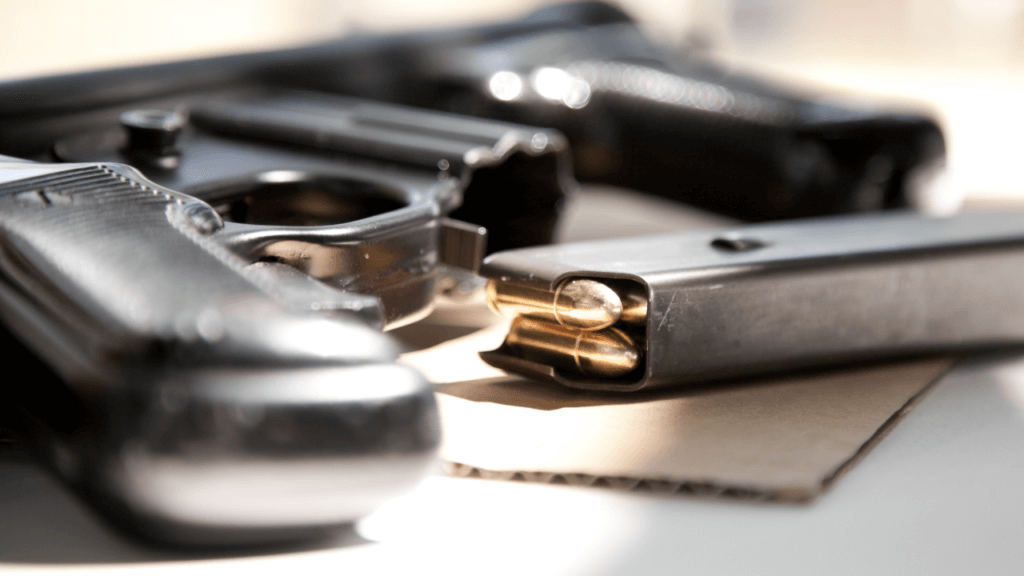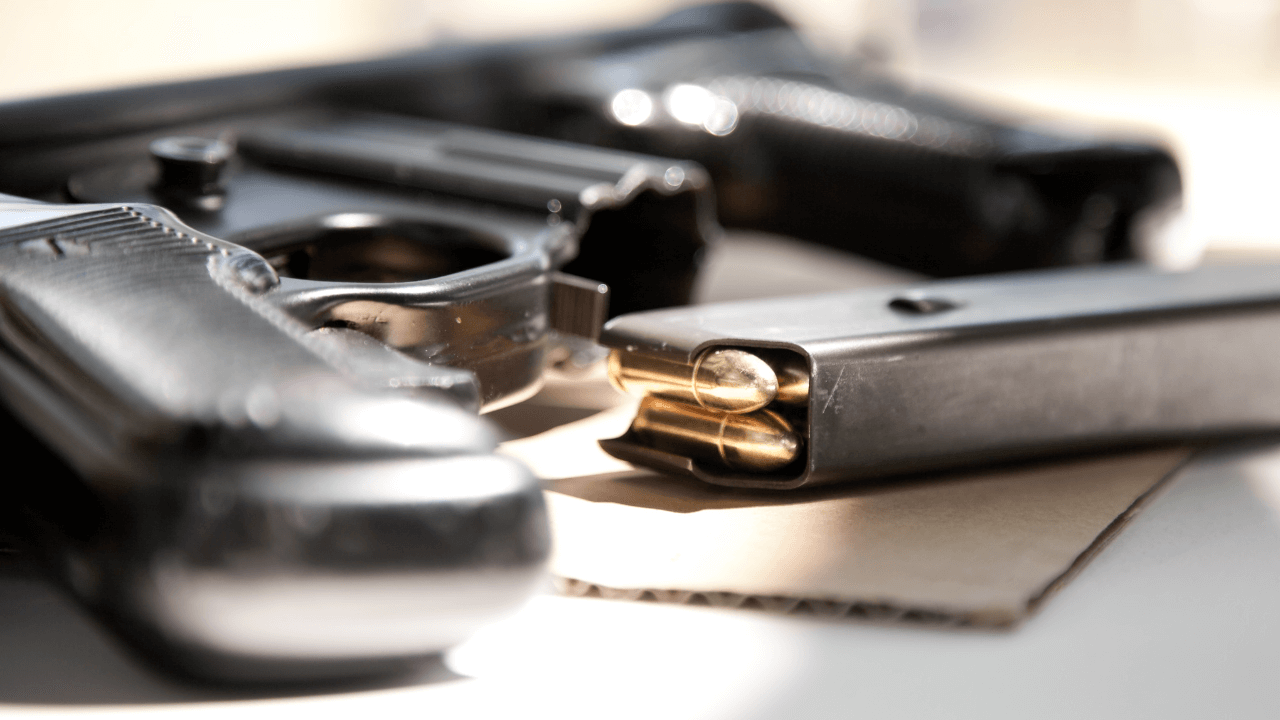
New Jersey has some of the strictest gun laws in the country and takes gun offenses very seriously. Even if the accused has never been convicted of a crime in the past, they face a real possibility of jail time if convicted of a gun charge.
That is why it is important to fight a gun charge as much as possible. There are a number of ways to do that, depending on the charges and the circumstances of the case. This article will help those accused of a gun charge in New Jersey understand the charges, the potential consequences, and how to fight it. If you face a gun charge, do not do it alone – call Rosenblum Law for a free consultation with one of our experienced defense attorneys.
Understanding Gun Laws in New Jersey
The four most common gun charges in New Jersey are:
- Unlawful possession of a weapon
- Possession of a weapon for unlawful purposes
- Possession of a prohibited weapon
- Possession of a defaced weapon
All four of these are second-degree crimes, which means they are felonies punishable by jail time. The Graves Act makes these gun charges even more severe, with minimum prison terms that must be served before being eligible for parole.
New Jersey’s strict gun laws are found in Title 13 Chapter 54 of the state code. One must have a Firearm Identification Card (FID) to purchase guns or ammunition in New Jersey. A permit is also required to purchase a handgun, and a separate permit is required to carry a gun.
However, gun registration is not required in New Jersey. If someone purchased a gun legally in another state and moved to New Jersey, that individual would not need a New Jersey FID until they want to purchase ammunition. In other words, the gun itself would still be owned legally even without a FID. In addition, a FID is not needed for a gun that someone inherits.
Consequences of Gun Charges
The potential penalties for different types of gun charges in New Jersey are steep and based on the degree of the crime.
- First-degree gun charges include using a gun to commit a crime such as murder, kidnapping, or robbery. These charges carry a penalty of 10-20 years in prison. The Graves Act states that if convicted of this charge, there is no possibility of parole.
- Second-degree gun charges carry a prison term of 5-10 years. The Graves Act requires that at least 3 ½ of these years, or half of the prison term, whichever is greater, must be served before the possibility of parole. Unlawful possession of a gun or possession of a gun for unlawful purposes are examples of second-degree crimes.
- Third-degree gun charges carry a prison term of 3-5 years. Third-degree gun charges typically involve an Airsoft BB gun. Most first-time offenders of third-degree crimes do not serve jail time, but instead are offered parole and community service.
- Fourth-degree gun charges are rare and mostly involve illegal ammunition, stun guns, or knives. The punishment for a fourth-degree weapons charge is up to 18 months in prison.
All of these gun charges are felonies in New Jersey. Felons have limited rights; for example, a felon in New Jersey cannot own firearms or vote. Moreover, a felony charge may stay on one’s criminal record indefinitely or for a long duration, which can make it difficult to find a job.
How to Beat a Gun Charge in New Jersey
There are several ways to beat or reduce a gun charge in New Jersey, depending on the facts of the case.
Illegal Search
The first most common defense is to challenge the search. An illegal search without consent or probable cause could lead to the gun being inadmissible as evidence and the charges being dismissed.
Similarly, one can challenge a vehicle stop and search without probable cause. If probable cause was lacking, any subsequent evidence including a gun is inadmissible in court, and the charges can be dismissed.
Invalid Warrant
An invalid warrant is one that has not been completed properly or on which law enforcement made false representations as to what they would find. Challenging the validity of the warrant can lead to the gun being inadmissible as evidence and the gun charges dismissed.
Elements of the Crime
One can also challenge elements of the crime charged – for example, whether or not the accused was actually in possession of a gun. For charges of possession of a gun for unlawful purposes, one can argue that there was no criminal intent involving the gun.
Plea Agreement
If the charges cannot be thrown out entirely, agreeing to plead guilty to a lesser charge can result in a lower penalty. The prosecution may require cooperation in exchange for the plea agreement, such as disclosing where a weapon was acquired. Plea agreements are often a better option than going to trial, as they usually involve probation rather than jail time.
Graves Act Waiver
The Graves Act imposes a minimum sentence for gun crimes. The act states that a minimum amount of that sentence must be served before being eligible for parole for second-degree, third-degree, and fourth-degree gun crimes, and it disallows parole for first-degree gun crimes.
It does not matter if it is a first offense; if someone is found guilty, the Graves Act applies. For example, a second-degree charge of unlawful possession comes with a sentence of 5 to 10 years in prison. The Graves Act mandates that at least 42 months (3.5 years) of this sentence be served before the individual is eligible for parole. For a third-degree gun crime, the term is 3-5 years, and a minimum of half of the term must be served before being eligible for parole. For a fourth-degree gun crime, at least 18 months must be served before parole.
However, it is possible to get a waiver of the Graves Act. Section 2C:43-6.2 of the New Jersey Statutes lays out the procedure for doing so. In particular, the prosecutor must file a motion stating that the minimum term would not serve the interests of justice and the defendant should receive a lesser term. This is only possible if one does not have any prior gun charges or a criminal record.
Prosecutors often use Graves Act waivers as incentives for plea agreements. The judge can either reduce the minimum sentence to one year or negate the jail sentence completely and give probation instead. However, without a skilled and qualified attorney, it may be difficult to obtain a Graves Act Waiver.
How an Attorney Can Assist Someone Facing Gun Charges in New Jersey
Experienced legal representation is essential to protect one’s rights and freedoms. An experienced criminal defense attorney will begin assisting someone facing gun charges in New Jersey by having an initial consultation. During this consultation, it is important to describe in detail any interactions with law enforcement, especially when it comes to how the gun was discovered.
The attorney will then gather evidence, witness testimony, and expert opinions. They will use this evidence to build a defense strategy tailored to the specific circumstances of the case. This could include challenging the warrant, search, or traffic stop to have the gun dismissed from evidence.
If the case goes to trial, the attorney will advocate for the accused in court proceedings. They will present arguments, evidence, and witnesses to show that the prosecution has not proved its case. That said, trials often can be avoided by a plea agreement, which an attorney must work out with the prosecutor. Negotiating with prosecutors for reduced charges and penalties is part of this process.
FAQs
A common defense against a charge of unlawful possession of a weapon is to prove that the gun is owned legally, e.g. that it was passed down through inheritance. A common defense against possession of a gun for unlawful purposes is to prove that there was no criminal intent in legally owning the weapon. Other common defenses center around challenging the search or warrant that led to the discovery of the gun. If the gun is found inadmissible as evidence, the charges must be dropped.
Yes, if you are convicted of a gun charge, you will be a felon and will lose the right to own firearms in the state of New Jersey.
New Jersey requires that gun charges go to trial or be resolved within 180 days of the accused’s first appearance in court, which is usually the arraignment. An exception can be made to this timeline if the court grants a motion by the prosecution.
Whether you should accept a plea deal or fight the charge depends on the facts of the case. If the prosecution’s case is strong, a plea deal could be your best bet for avoiding the minimum prison sentences mandated by the Graves Act. If you have a strong case, it could be worth it to fight in court. It is best to get the advice of an experienced attorney as to the best course of action.
You may be able to get a gun charge expunged from your record after a period of time. An attorney can give you the best idea of whether and when you will be eligible for expungement based on the degree of crime and circumstances of the case.
Call a Rosenblum Law Criminal Defense Attorney for a Free Consultation
Gun charges in New Jersey are a very serious matter and should be handled by a criminal defense attorney, especially with mandatory jail time required by the Graves Act. It is possible to beat a gun charge in New Jersey with the right defense or plea deal, but it takes experienced counsel to make that happen.
The criminal defense attorneys at Rosenblum Law have extensive experience handling various types of gun charges. Our attorneys will work for you to avoid jail time whenever possible. Contact us today at 973-750-9556 to schedule an initial consultation and case evaluation.






 888-815-3649
888-815-3649
